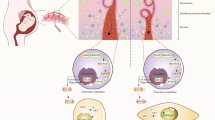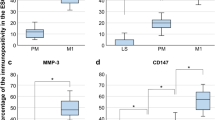Abstract
Introduction and hypothesis
Our aims were to correlate transforming growth factor (TGF)-β1 and elastin mRNA expression in the vagina of women and to measure the effects of TGF-β1 on vaginal smooth muscle cell (SMC) proliferation and tropoelastin production.
Methods
Vaginal walls were sampled in women (n = 20). TGF-β1 and elastin mRNA expression was assessed by RT-PCR. SMC cultures were performed from vaginal wall biopsies. SMC were incubated with TGF-β1, and cell proliferation was assessed by MTT-assay. Tropoelastin production was measured by the Fastin Elastin Assay.
Results
There was a significant positive correlation between TGF-β1 and elastin mRNA (r = 0.784, P < 0.01). SMC proliferation was significantly increased by 10 ng/mL TGF-β1 [relative cell number, mean ± SD, 198% ± 32% of control (P = 0.01)]. Tropoelastin production was significantly increased by TGF-β1 [mean ± SD, 645% ± 180% of control (P = 0.01)].
Conclusions
There is a positive correlation between TGF-β1 and elastin mRNA expression in the vaginal wall. In vitro, TGF-β1 increases vaginal tropoelastin production in vaginal SMC.





Similar content being viewed by others
References
Drutz HP, Alarab M (2006) Pelvic organ prolapse: demographics and future growth prospects. Int Urogynecol J Pelvic Floor Dysfunct 17(Suppl 1):S6–S9
Mant J, Painter R, Vessey M (1997) Epidemiology of genital prolapse: observations from the Oxford Family Planning Association Study. Br J Obstet Gynaecol 104:579–585
Weber AM, Buchsbaum GM, Chen B, Clark AL, Damaser MS, Daneshgari F, Davis G, DeLancey J, Kenton K, Weidner AC, Word RA (2004) Basic science and translational research in female pelvic floor disorders: proceedings of an NIH-sponsored meeting. Neurourol Urodyn 23:288–301
Nygaard I, Barber MD, Burgio KL, Kenton K, Meikle S, Schaffer J, Spino C, Whitehead WE, Wu J, Brody DJ (2008) Prevalence of symptomatic pelvic floor disorders in US women. Jama 300:1311–1316
Olsen AL, Smith VJ, Bergstrom JO, Colling JC, Clark AL (1997) Epidemiology of surgically managed pelvic organ prolapse and urinary incontinence. Obstet Gynecol 89:501–506
Handa VL, Cundiff G, Chang HH, Helzlsouer KJ (2008) Female sexual function and pelvic floor disorders. Obstet Gynecol 111:1045–1052
Chen BH, Wen Y, Li H, Polan ML (2002) Collagen metabolism and turnover in women with stress urinary incontinence and pelvic prolapse. Int Urogynecol J Pelvic Floor Dysfunct 13:80–87, discussion 87
Takacs P, Gualtieri M, Nassiri M, Candiotti K, Fornoni A, Medina CA (2010) Differential expression of smooth muscle regulatory proteins in the uterosacral ligaments of women with uterine prolapse. Am J Obstet Gynecol 202(620):e1–e5
Takacs P, Gualtieri M, Nassiri M, Candiotti K, Fornoni A, Medina CA (2009) Caldesmon expression is decreased in women with anterior vaginal wall prolapse: a pilot study. Int Urogynecol J Pelvic Floor Dysfunct 20:985–990
Takacs P, Nassiri M, Gualtieri M, Candiotti K, Medina CA (2009) Uterosacral ligament smooth muscle cell apoptosis is increased in women with uterine prolapse. Reprod Sci 16:447–452
Wen Y, Polan ML, Chen B (2006) Do extracellular matrix protein expressions change with cyclic reproductive hormones in pelvic connective tissue from women with stress urinary incontinence? Hum Reprod 21:1266–1273
Zong W, Stein SE, Starcher B, Meyn LA, Moalli PA (2010) Alteration of vaginal elastin metabolism in women with pelvic organ prolapse. Obstet Gynecol 115:953–961
Karam JA, Vazquez DV, Lin VK, Zimmern PE (2007) Elastin expression and elastic fibre width in the anterior vaginal wall of postmenopausal women with and without prolapse. BJU Int 100:346–350
Klutke J, Ji Q, Campeau J, Starcher B, Felix JC, Stanczyk FZ, Klutke C (2008) Decreased endopelvic fascia elastin content in uterine prolapse. Acta Obstet Gynecol Scand 87:111–115
Goepel C (2008) Differential elastin and tenascin immunolabeling in the uterosacral ligaments in postmenopausal women with and without pelvic organ prolapse. Acta Histochem 110:204–209
Liu JM, Davidson JM (1988) The elastogenic effect of recombinant transforming growth factor-beta on porcine aortic smooth muscle cells. Biochem Biophys Res Commun 154:895–901
Morty RE, Konigshoff M, Eickelberg O (2009) Transforming growth factor-beta signaling across ages: from distorted lung development to chronic obstructive pulmonary disease. Proc Am Thorac Soc 6:607–613
Zaher H, Shaker OG, EL-Komy MH, El-Tawdi A, Fawzi M, Kadry D (2009) Serum and tissue expression of transforming growth factor beta 1 in psoriasis. J Eur Acad Dermatol Venereol 23:406–409
Shindel AW, Lin G, Ning H, Banie L, Huang YC, Liu G, Lin CS, Lue TF (2010) Pentoxifylline attenuates transforming growth factor-beta1-stimulated collagen deposition and elastogenesis in human tunica albuginea-derived fibroblasts part 1: impact on extracellular matrix. J Sex Med 7:2077–2085
Zuckerwise L, Banks E, Zhu C, Brouwer-Visser J, Huang GS (2009) Transforming growth factor-beta 1 overexpression in pelvic organ prolapse. J Pelvic Med Surg 12:266
Lin G, Ning H, Wang G, Banie L, Lue TF, Lin CS (2010) Effects of birth trauma and estrogen on urethral elastic fibers and elastin expression. Urology 76(1018):e8–e13
Bump RC, Mattiasson A, Bo K, Brubaker LP, DeLancey JO, Klarskov P, Shull BL, Smith AR (1996) The standardization of terminology of female pelvic organ prolapse and pelvic floor dysfunction. Am J Obstet Gynecol 175:10–17
Takacs P, Zhang Y, Jaramillo S, Bardawil T, Candiotti K, Medina CA (2010) The effects of estrogen, progesterone and polypropylene mesh on vaginal smooth muscle cell proliferation. J Smooth Muscle Res 46:9–15
Yamamoto K, Yamamoto M, Akazawa K, Tajima S, Wakimoto H, Aoyagi M (1997) Decrease in elastin gene expression and protein synthesis in fibroblasts derived from cardinal ligaments of patients with prolapsus uteri. Cell Biol Int 21:605–611
Lin G, Shindel AW, Banie L, Ning H, Huang YC, Liu G, Lin CS, Lue TF (2010) Pentoxifylline attenuates transforming growth factor-beta1-stimulated elastogenesis in human tunica albuginea-derived fibroblasts part 2: interference in a TGF-beta1/Smad-dependent mechanism and downregulation of AAT1. J Sex Med 7:1787–1797
Zhang MC, Giro M, Quaglino D Jr, Davidson JM (1995) Transforming growth factor-beta reverses a posttranscriptional defect in elastin synthesis in a cutis laxa skin fibroblast strain. J Clin Invest 95:986–994
Davidson JM, Zoia O, Liu JM (1993) Modulation of transforming growth factor-beta 1 stimulated elastin and collagen production and proliferation in porcine vascular smooth muscle cells and skin fibroblasts by basic fibroblast growth factor, transforming growth factor-alpha, and insulin-like growth factor-I. J Cell Physiol 155:149–156
Kahari VM, Olsen DR, Rhudy RW, Carrillo P, Chen YQ, Uitto J (1992) Transforming growth factor-beta up-regulates elastin gene expression in human skin fibroblasts. Evidence for post-transcriptional modulation. Lab Invest 66:580–588
Paladini D, Di Spiezio SA, Mandato VD, Guerra G, Bifulco G, Mauriello S, Nappi C (2007) Association of cutis laxa and genital prolapse: a case report. Int Urogynecol J Pelvic Floor Dysfunct 18:1367–1370
Conflicts of interest
None.
Author information
Authors and Affiliations
Corresponding author
Rights and permissions
About this article
Cite this article
Takacs, P., Zhang, Y., Yavagal, S. et al. TGF-beta 1 is a potential regulator of vaginal tropoelastin production. Int Urogynecol J 23, 357–363 (2012). https://doi.org/10.1007/s00192-011-1589-7
Received:
Accepted:
Published:
Issue Date:
DOI: https://doi.org/10.1007/s00192-011-1589-7




